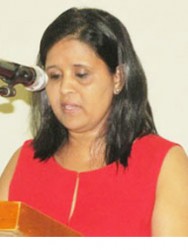The Ministry of Health hosted a national conference for Persons Living with HIV (PLHIV) focused on empowering infected persons to take ownership of their health, and addressing gaps in the availability and sustainability of HIV social support services.
The ministry, through the National AIDS Programme Secretariat (NAPS) targeted approximately 50 peer support group leaders from regions Two, three, Four, Five, Six and Ten to discuss the quality of social support services provided through the national HIV care and treatment, to identify the gaps and to make recommendations to address them.
In a press release, NAPS said the two-day seminar, which was held on Tuesday and Wednesday, discussed empowering PLHIV to become actively involved in ensuring the sustainability of HIV care, treatment and support programmes. It was held under the theme ‘Motivation Towards Positive Living, Supporting Sustainability.’

NAPS Programme Coordinator Dr Shanti Singh said PLHIV taking charge of their health is an essential part of the recently launched HIVision 2020 initiative. One of the guiding principles of the HIVision 2020 is the greater involvement of People Living with HIV and AIDS, meaning not only more central involvement in decision making at policy and other higher levels, but also more ownership of their health and health outcomes.
According to Dr Singh, NAPS has achieved several milestones and Guyana is now one of 14 countries to have achieved universal access to care and treatment. This was done via a multi-sectoral collaboration and the commitment of all stakeholders. She encouraged all participants to cooperate to ensure that Guyana continues to provide high quality treatment to all persons living with HIV. Chrystol Albert-Hope, Programme Manager at G-Plus, acknowledged the tremendous strides made by the national programme over the years. She noted the commencement of free anti-retroviral treatment in 2002, the near elimination of mother-to-child transmission of HIV and the reduction of stigma and discrimination associated with HIV among its significant achievements. In addition, recently-appointed head of PANCAP Dereck Springer acknowledged that Guyana has a lot to celebrate as over the past 20 years an HIV diagnosis has moved from being seen as a death sentence to a point where persons know they can still lead positive lives. Springer noted that Guyana has also gone beyond other Caribbean countries in providing community home and palliative treatment.
He urged participants to look at shared responsibility and self-management as focus is on country ownership in the wake of decreasing donor funding for HIV. Springer also said the increasing survival of PLHIV has brought with it the additional challenges of aging and the onset of other chronic diseases, such as diabetes and hypertension. He pledged PANCAP’s continued support to working closer with Guyana during his tenure.
UNAIDS Country Director Dr Roberto Campos gave a briefing on the UNAIDS strategy of zero new infections, zero new HIV-related deaths, and zero stigma and discrimination. He noted that the epidemic had changed from one of despair to hope and HIV is no longer a death sentence.
According to the press release, Dr Campos also emphasised the need for government and civil society to work together in combating HIV and the need to mobilise resources locally. He highlighted the central role that PLHIV can play in controlling the epidemic by adhering to treatment as this reduces the chance of transmission to only four per cent.
Meanwhile, Joseph Hamilton, Parliamentary Representative at the Health Ministry said that everyone has a role to play in controlling the spread of HIV. An essential part of the draft 2013 to 2020 health strategy focuses on the need for greater efficiency in the health system and the need for greater value for money, as donor funding decreases. Hamilton also said that political will exists both at the level of the government and the ministry in addressing HIV in Guyana.
On the first day of the conference, presentations were also made on mental health and substance abuse, domestic violence and parenting. A panel discussion was also held on positive living. Topics delivered on the second day of the seminar focused on the availability and sustainability of HIV care and treatment services, and the support services available to PLHIV at the housing ministry, the Central Recruitment and Manpower Agency, IPED, Food for the Poor, and the NIS. At the close of the sessions, the conference was expected to develop a strategy on how to sustain support services at government and NGO operated HIV care and treatment sites.




